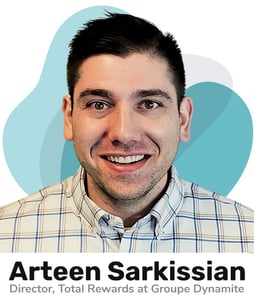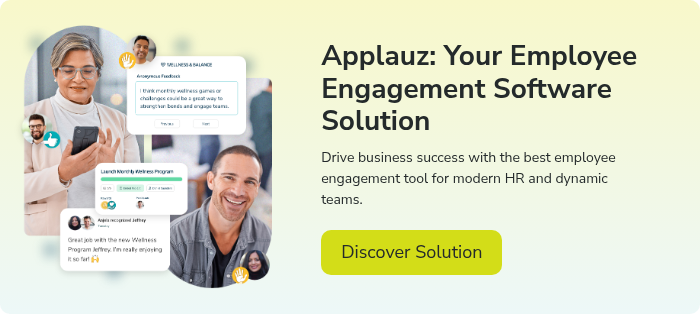Arteen joins our meeting on a cloudy Tuesday afternoon in late March. When he pops into our Google Meet room, I am greeted by his relaxed demeanour and smile. Even if we have never met before, I feel instantly at ease.
I notice Arteen is in an office; I can see the wall behind him decorated with a Ron Swanson "Pyramid of Greatness" poster from the TV series Park and Rec. Already, I am getting a sense of the type of leader Arteen is and the culture at Groupe Dynamite, where Arteen works as the Director of Total Rewards.
"You're in an office!" I start by exclaiming. "Yeah!" He enthusiastically replies as he grabs his webcam to offer me a glimpse of this airy and bright fashion office.
He explains that most employees come to the office three days a week. "But of course, it depends on the type of role you're doing. Some employees need to be on-site more because of their job. But we try to give leaders flexibility in deciding what they want their team to do."
It's clear that Dynamite trusts their leaders and teams, which is exactly one reason I wanted to talk with Arteen; Groupe Dynamite is a client of Applauz Service Awards, and we've been hearing lots of great things about their culture.
Arteen shares how listening to employees has been a pivotal approach in building a strong EVP for Dynamite's employees.
Most notably, they have recently rolled out some innovative programs, including an open vacation policy, something not commonly seen in the fashion retail industry.
Arteen and I spend the rest of our meeting diving deep into the topic of work culture. We discuss a wide range of topics, like the rollout of their new open vacation policy. Arteen unpacks some of the myths and misconceptions people have about it. We also talk about how to drive greater happiness at work; Arteen shares how listening to employees has been a pivotal approach in building a strong EVP for Dynamite's employees.
Michelle: So the big question, how do you decide which HR policies and programs get green-lit? What's your process for program ideation and creation?
Arteen: We're big on asking our employees' opinions. It's part of our corporate identity. We currently do quarterly surveys and a longer annual one. And soon, we're going to launch one bi-weekly. With that said, it's one thing to ask for their opinion, and it’s another to then act on it. With us, I would say we have a good history of asking for employee opinions and doing something about it.
Michelle: That segues nicely into my question about your open vacation policy. I was so interested to hear about where the idea came from.
Arteen: We are a performance-driven culture, and we knew employees wanted the ability to have more time off; they didn't want to be handcuffed to a certain number of weeks. As we are focused on delivering value to the organization and keeping people accountable. In that same spirit, they have the flexibility to choose their time off according to their deliverables. They own their agendas. A few strategic initiatives have been deployed to position Groupe Dynamite as an industry leader, and this policy supports the culture we strive to develop. We knew this would contribute to our position of best in class.
Michelle: It's great that you listen to your employees rather than what other companies are doing because I’ve heard a lot of skepticism about unlimited vacation policies.
Arteen: Companies skeptical about these kinds of policies; to me, means that trust and flexibility are not a part of their culture. Some companies need strict rules and guidelines because that's the only way they can function.
Michelle: And the feedback has been positive?
Arteen: Yes, definitely. I think our employee demographics help. A lot of our team is in a younger and more creative demographic. When people aren't trusted or have ownership of their world, it might not be an effective policy for your company.
...when your culture already has an entrepreneurial mindset, people are going to come, and they're going to try to optimize what they're provided.
Michelle: Interesting, so there's a link between a culture of trust and ownership and this policy being successful.
Arteen: For sure, when your culture already has an entrepreneurial mindset, people are going to come, and they're going to try to optimize what they're provided. They'll try to work smarter to reach their goal, then suddenly–oh wow, I managed to shave this project down by one week. Guess I can take a week off!
Michelle: Yes, that makes so much sense.
Arteen: Imagine if you weren’t capped to a specific amount of time off; don’t tell me you wouldn’t find a way to optimize what you're doing so that you can take some time off. In turn, working smarter not only helps you but is going to help the business.
Michelle: That's such a positive outcome. I hear a lot of employees who've expressed frustration when their company offers an unlimited vacation policy. They feel it’s just for show; no one actually takes advantage of it.
Arteen: Yeah, I would say in those cases, the company needs to do a better job of pushing the values of the policy through. If your executive leadership is behind it, their leaders will get behind it, supervisors will be behind it, and then the employees will be behind it. It all trickles down from the top.
Michelle: Absolutely, everything has to be actively supported from the top.
Arteen: We launched it last year, and for sure, we are still experiencing growing pains, but we're learning from it. We're trying to figure out how to support managers that feel like they can't take advantage of this perk. We don't want anyone to feel that this was an empty policy.
Michelle: Totally. So your HR team was sold on the idea. Did you have a hard time selling the idea to your executive team? What was that process like?
Arteen: Our president and CEO, he's a hundred percent behind the initiative.
Michelle: That's awesome.
Arteen: Yeah, he's a huge believer. He believed that this would attract the right people and retain high performers. In his opinion, the people who will use this policy are the entrepreneurial type who will find and organize their time more effectively. And we want to attract that type of person to our company.
Michelle: It's so great to have support from your executive team. I hear a lot of HR people express frustration when executives don't support employee engagement initiatives.
Arteen: Yes, our president puts a lot of value on people. He knows how important people are to a business. He hates seeing any indication of turnover increasing.
Michelle: Oh really?
Arteen: Well, we operate in the retail space where turnover is generally quite high. Some retailers might just accept it and say, "It's just part of the industry," But for us, it's not something that we sit there and accept. We're always trying to find a way to engage and enable our workforce and our top performers, regardless of what part of the business they work in.
Michelle: I love that type of enthusiasm from executives about their workforce.
Arteen: And I think figuring out why employees are unhappy or happy isn't complicated. You don't need to do any in-depth analysis. You need to ask and actually listen.
If you listen to your employees, you'll unlock a lot of your problems.
Michelle: Exactly, and most of the time, when people are unhappy at work, it boils down to one or two reasons.
Arteen: Exactly. You just need to focus on the information they give you. If you listen to your employees, you'll unlock a lot of your problems. But not all problems have a simple solution, so sometimes we also have to get creative.
Michelle: That sounds like a big challenge…
Arteen: Think about it, as an overall business, we are dealing with employees in all types of roles. So as an employer of choice, we're competing with other brick & mortar retailers for our retail staff, with banks and insurance companies for our operations, and transportation companies for our distribution center teams. Traditionally, people would think that money can solve retention problems anywhere; but I believe since the pandemic, most businesses have learned that it is no longer the only thing driving talent long-term.
...cash won’t be your formula for retaining talent past a year.
Michelle: Of course, that's psychology 101.
Arteen: A fair salary is a minimum requirement to get someone through the door. Once that’s established, cash won’t be your formula for retaining talent past a year.
Michelle: I completely agree. So you mentioned that you poll your staff about what they want in terms of policies, etc., but you also poll your staff about their general happiness.
Arteen: Absolutely. Gauging employee happiness will play a big part in our newest survey initiative. And I think at the rate we’ll be collecting data, that will give us early insight into the areas we need to focus on.
Michelle: So, in the past, have you introduced any perks or benefits that didn't see as much success? What happens when you roll out a program that doesn't work out as you thought it would?
Arteen: I think we've yet to experience that. Like we mentioned earlier, we survey our employees so often it's not like…we're not guessing, you know. We've asked, we've heard, and now let's go and deliver that. When we roll something out, we are pretty confident employees will be receptive to it.
Michelle: It seems you've had great success with this approach. Are there other perks or programs that have seen success, like the open vacation policy?
Arteen: We were early adopters of telemedicine. That's been one of our biggest perks that people have enjoyed having access to. With that being so important to our employees, we also added a few mental health resources to ensure our employees are well supported.
Michelle: Especially in Quebec, where it can be so hard to get a family doctor.
Arteen: Yeah, I would definitely say with this benefit, we were likely an early adopter in the retail fashion space.
Michelle: We have a tool like that at Applauz too, and the staff really appreciates it.
Arteen: At the end of the day, you want to offer people a comprehensive package of comp and benefits and then let employees do their thing, you know. Let them be creative, have a great team environment, and let them live and take ownership of their work.
About the author
 Michelle Cadieux
Michelle Cadieux
Michelle is a content writer for Applauz. She holds a Bachelor's degree in Psychology from Concordia University, and she has been writing about work and employee happiness for over five years.






